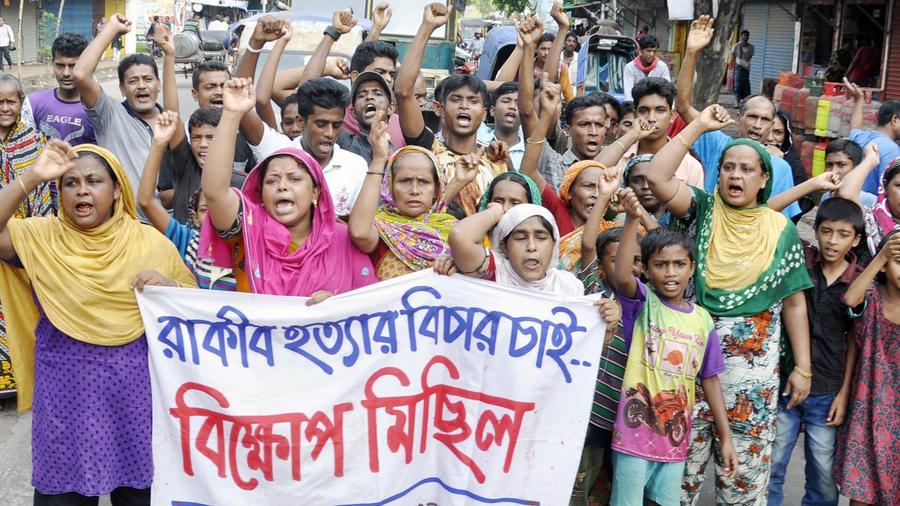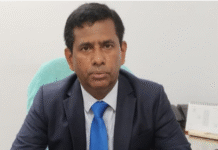A 10-year-old boy bludgeoned in the head with a crowbar after a neighbor accused him of stealing fish.
A 12-year-old allegedly tortured to death by a former boss for joining a competitor.
A 13-year-old tied to a pole and swatted to death by men who accused him of stealing a van – and captured the beating on a cellphone video.
These three grisly killings have occurred over the last month in Bangladesh, a country where poverty, lawlessness and rampant underage labor pose grave risks to children.
The incidents have shocked the South Asian nation, where activists on Wednesday formed a human chain in the southern city of Khulna to protest the killing of the 12-year-old.
Police said the boy, the son of a truck driver and identified only as Rakib, had recently quit his job at the Sahrif Motorcycle Garage and gone to work for a rival body shop. Sahrif’s owner and his brother allegedly caught Rakib on Monday evening as he walked past their shop and locked him inside, at one point pumping air into his rectum using a compressor hose.
Rakib’s belly swelled up and he started vomiting, authorities said. The suspected assailants brought the boy to a hospital, but he died of internal bleeding a few hours later.
A mob chased down the suspects before they could leave the hospital and roughed them up before police took them and a woman into custody, where they await murder charges, police said.
After Rakib was buried Tuesday, his mother, Lucky Begum, told reporters, “I want justice for my son. I want the three to hang.”
As that case was making national news, the body of Rabiul Awal, a fourth-grader, was found in a canal near his home in the southern district of Barguna, authorities said Wednesday.
Police arrested a neighbor who family members said had accused the boy of stealing fish from his nets and threatened to kill him.
The Child Rights Advocacy Coalition in Bangladesh, representing 10 organizations, said in a statement that it was “concerned and aggrieved by the recurrence of such incidents and the nature of the brutalities.”
Although Bangladesh has made strides in reducing poverty rates in recent years, human rights advocates say abuse of children remains common, and a weak legal system often fails to hold perpetrators to account. The legal working age is 14, but in the poorest pockets of the country experts say that children as young as 10 work informal jobs in small factories and workshops, placing them at risk of exploitation.
United Nations Children’s Fund surveys show that 4.7 million Bangladeshi children younger than 14 hold jobs. Many others help their families in small or home-based businesses.
“We do not adequately value children,” said Michael McGrath, country director for the international advocacy group Save the Children. “Instead of treating them as the most cherished, vulnerable, precious people in our society, they are seen as the most exploitable, easily manipulated and cheap labor.”
McGrath said that Bangladesh’s culture of impunity, characterized by ineffective investigations and a slow judicial process, leads perpetrators to believe that they can avoid consequences.
The country is still reeling from a July 8 incident in the eastern city of Sylhet, in which 13-year-old Samiul Alam Rajan was beaten to death with a metal rod as his attackers captured the assault in a 28-minute video.
Samiul, who was working as a vegetable vendor in the Sundar Ali market area, was tied to a pole at a bus station. The video shows his assailants ordering him to admit he stole a van. When the boy screams, his tormentors laugh and swear at him.
In footage that went viral on social media last month, when Samiul asks for water, the men tell him to drink his own sweat. They wring his left hand and right leg and bash his stomach with a stick.
When he is told to walk away, an assailant is heard saying, “His bones are apparently intact; beat him some more,” at which point he is tied up and thrashed again.
When Rajan asks to be handed over to the police, one man replies, “I am the police.”
The incident generated a firestorm, with human rights activists staging mass rallies and top officials vowing to punish the perpetrators. Nearly a dozen people have been arrested in the killing, including one man, Kamrul Islam, who fled to Saudi Arabia following the incident and reportedly confessed to the crime after being captured there.
Bangladeshi authorities have said they will try to extradite him to face murder charges.
Kader is a special correspondent. Staff writer Bengali reported from Kuala Lumpur, Malaysia.
Source: LATimes










